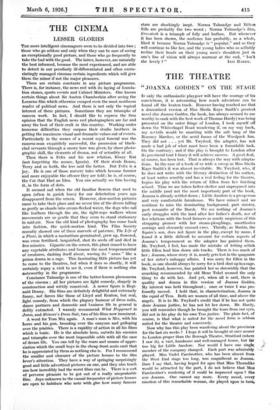THE CINEMA
LESSER GLORIES
THE more intelligent cinemagoers seem to be divided into two ; those who go seldom and only when they can be sure of seeing
an exceptionally good picture, and those who go frequently to take the bad with the good. The latter, however, are naturally the best informed, because the most experienced, and are able to detect in our peculiarly ill-differentiated and often excru- ciatingly managed cinemas certain ingredients which will give them the minor if not the major pleasures.
There are certain constants in any picture programme. There is, for instance, the news reel with its laying of founda- tion stones, sports events and Cabinet Ministers. One knows certain things about Sir Austen Chamberlain after seeing the Locarno film which otherwise escaped even the most assiduous reader of political news. And there is not only the topical interest of these pictures. Sometimes they are triumphs of camera work. In fact, I should like to express the firm opinion that the English news reel photographers are far and away the best of their craft in this country. Working under immense difficulties they surpass their studio brothers in getting the maximum visual and dramatic values out of events. Particularly in the scenes of a recent royal funeral was the camera-man exquisitely successful, the procession of black- clad servants through a snowy lane was given, by sheer photo- graphic skill, the elements of drama, not of actuality at all.
Then there is Felix and his new relation, Krazy Kat (not forgetting the mouse, Ignatz). Of their rivals Bonzci, Terry and so forth, the less said the better. But Felix is a joy. He is one of those nursery tales which become funnier and more enjoyable the oftener they are told ; he is, of course, the Cat that Had an Idea. You can actually see him having it, in the form of dots.
It seemed sad when the old familiar flowers that used to open (often in garish hues) for our delectation years ago disappeared from the screen. However, slow-motion pictures came to take their place and we never tire of the divers falling as gently as clouds into cream-flecked water, the dogs who sail like feathers through the air, the tight-rope walkers whose movements are so gentle that they seem to stand stationary in mid-air. Now the old kind of photography has come back into fashion, the quick-motion kind. The Film Society recently showed one of these marvels of patience, The Life of a Plant, in which a nasturtium germinated, grew up, flowered, was cross fertilized. languished, shot its seeds off and died in five minutes. Gigantic on the screen, this plant ceased to have any vegetable attributes and became the most temperamental of creatures, dashing itself about, waving its arms " like a prima donna in a rage. This fascinating little picture has yet to come to the theatres, but when it does so shortly, it will certainly repay a visit to see it, even if there is nothing else noteworthy in the programme.
Constance Talmadge is one of the better-known phenomena of the cinema ; all her pictures are light comedy, shapely in construction and wittily conceived. A newer figure is Regi- nald Denny. His films.are definitely delightful and extremely funny, not farces like those of Lloyd and Keaton, but real, light comedy, from which the plaguey humour of dress suits, dance partners and domestic and business life in general is deftly extracted. I warmly recommend What Happened to Jones, and Skinner's Dress Suit, two of his films now imminent.
A word for Tom Mix again. A man's man is Mix, with his horse and his gun, brooding over the canyons and galloping over the prairies. There is a rapidity of action in all his films which is tonic. He is the absolute hero, outwits his enemies and triumphs over the most impossible odds with all the ease of dream life. You can tell by the roars and moans of appre- ciation which the small boys in the cheap front seats emit that he is appreciated by them-as nothing else is. For I recommend the smaller and obscurer of the picture houses to the film lover's attention. They have a way of springing surprisingly good and little advertised pictures on one, and they also teach one how incredibly had the worst films can be. There is a sort of perverse pleasure to be got out of a really unspeakable film. Joys unknown to the casual frequenter of picture hou.ses are open to habitués who note with glee how many famous
stars are shockingly inept. Norma Talmadge and Milton Sills are probably the two worst ; Norma Talmadge's film, Graustark is a triumph of folly and bathos. But whenever it has been shown, the audience has probably, as a whole, liked it because Norma Talmadge is " popular," and so they will continue to like her, and the young ladies who so selfishly recline their heads on their young men's shoulders just in one's line of vision will always murmur at the end, " Isn't






































































 Previous page
Previous page